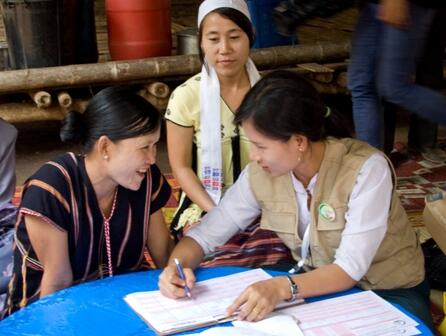YANGON — Myanmar’s first census in 30 years is nearly completed, and by the next to last day of the exercise over 90 per cent of the country’s estimated population has been counted, according to government officials. Some 120,000 enumerators have visited millions of households since the exercise began on 30 March.
Reports from around the country indicate that enumeration has gone largely according to plan in most locations, including in nearly all areas controlled by ethnic armed groups.
The main exception is Rakhine State, where there are numerous accounts of households not being enumerated when residents said their ethnicity is Rohingya.
U Khin Yi, the Minister of Immigration and Population, visited enumeration sites in Mon and Kayin States yesterday, including in areas under the control of the Karen National Union (KNU). A senior KNU military commander welcomed the minister and UN officials accompanying him, and the group observed local enumerators recording census responses by heads of some of the last households in their villages to be counted. None reported any difficulties. (See story.)
In Southern Shan State earlier in the week, the chairman of the Pa-O autonomous zone told visitors that the census was proceeding smoothly, and said he expected it would yield information that could greatly facilitate economic development and strengthen social services in the region. (See story.)
UNFPA, the United Nations Population Fund, has mobilized resources and provided technical support for the census, and has deployed observer teams to each of the country’s 15 states and regions. Janet Jackson, UNFPA Representative in Myanmar, said that preliminary reports from the observers suggest that, outside of Rakhine State, local authorities and enumerators have followed agreed procedures without encountering serious difficulties.
“This is the first truly people-centred and people-driven exercise in the country’s reform,” Ms. Jackson stated. “It is regrettable that in one state this did not happen.”
In Rakhine State, enumeration has not been completed in many households where respondents wanted to record their ethnic group as Rohingya. The Government last week announced that Rohingya would not be allowed as a response despite earlier assurances that everyone could freely self-identify their ethnicity. The Ministry of Immigration and Population asserts it acted to prevent possible bloodshed in the polarized region. UNFPA has expressed concern that the action contravenes human rights principles and international census standards.
Census activities have also not taken place in conflict areas controlled by the Kachin Independence Organization. The MoIP still hopes to negotiate an agreement with the KIO to enumerate those areas later.


